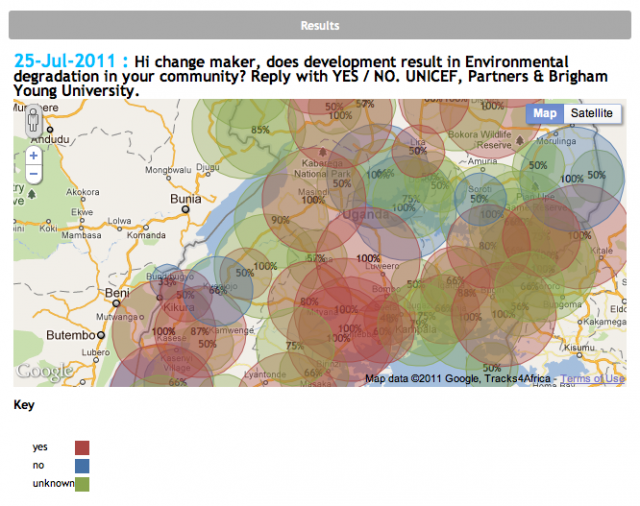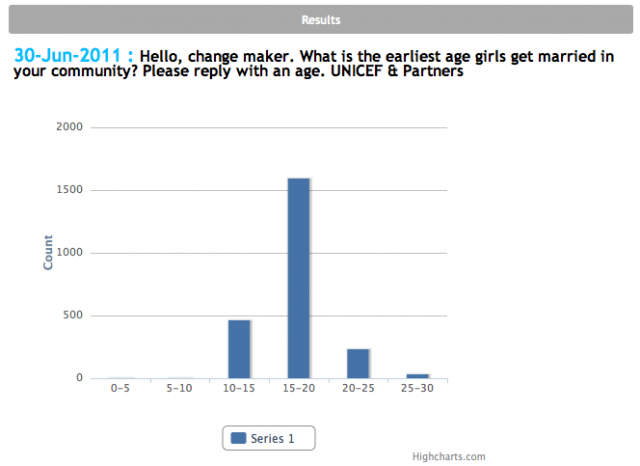For aid organizations, knowing what local communities and beneficiaries want and need is the key to running successful, sustainable programs. In Uganda, UNICEF is using mobile phones and broadcast media to get direct feedback from Ugandans on everything from medication access to water sanitation. The project, called uReport, allows users to sign up via a toll-free shortcode for regular SMS-based polls and messages. Citizen responses are used both in weekly radio talk shows to create discussion on community issues, and shared among UNICEF and other aid organizations to provide a better picture of how services work across Uganda.
Sean Blaschke, a Technology for Development specialist at UNICEF Uganda, explains that uReport gathers information from participants and informs citizens of their rights and available services. Recent polls have included questions about school dropouts, water point availability, mosquito net usage, and youth employment, all collected via SMS polls.
The use of SMS makes the program available to all literate mobile users regardless of handset; says Blaschke,
“There are great applications for smartphones, but if we have to provide people with a $400 device and bring them in to three-to-five days of training in order to role it out nationally, then we're going to need more money than we have. So uReport takes this more viral approach, this training-less approach to the system where, by word of mouth, you hear about this number, you hear about this system. You send in a message and then through an SMS scripted dialogue, you learn about the system. We gather information from them (their age, their sex, what community groups they're active in, what health facility they report to, what school they go to) that helps us tag demographic, location-specific data to that phone number. So essentially we turn a dumb phone into a smartphone.”
Blaschke says that using SMS scales better as it's a low-cost way to communicate, and familiar to users.
Blaschke explains that the uReport program allows UNICEF to capture “perception data,” the kind of information that quantitative reporting may miss. He says, “We know hard numbers, but we often don't know within the system what people think, and that's as important as anything else." In June, uReport expanded nationwide and already has more than 28,000 registered users receiving messages and polls.
Building Local Partnerships
According to Blaschke, a major factor in getting people involved in uReport is the close relationships UNICEF Uganda has built with local partners. UNICEF Uganda partnered with local organizations that work with children and youth (such as the Scouts Association and faith-based organizations). Blaschke says that the partner organizations have been key to the growth and high response rate of uReport as their strong, permanent presences in Uganda and neighboring countries give them clout in the community. The relationships are mutually beneficial, as the partner organizations can use uReport to conduct polls and outreach on topics important to their missions, while UNICEF and the organizations can both use the data to identify problem areas and enact change.
The shortcode works across all five major telecoms in Uganda, so participants can answers polls and receive messages for free regardless of which network carrier they use. In the first few weeks of polls, the organization had an 18% response rate; recently UNICEF has been testing out incentives (both physical incentives like offering Google solar chargers to participants and social incentives like thanking and reading uReporters’ names on the radio) and saw response rates rise to 30% of uReport members.
uReport provides the partner organizations with a tool to communicate with each other to create dialogue on common issues. For example, Blaschke says the Scouts Association was interested in water sanitation and hygiene at the community level; since UNICEF also wanted information on this topic, the organizations worked together to send out a uReport poll about water access to get information directly from citizens.
Spreading The News
The results from the polls are posted on the uReport website so that anyone can see the results. They are posted as maps, charts, and word clouds, depending on the nature of the poll.
Results from a poll on environmental degradation:

Results from a poll on early marriage for girls:

In late July, uReport launched a second component of the project – disseminating the opinions and observations they collect to a larger audience through a radio talk program. In order to use uReport to promote accountability and transparency, the results of the polls are broadcast across Uganda on the radio in order to share the results with the community at large so that the information is freely available. UNICEF makes much of the uReport data available on their website, so that both beneficiaries and other organizations can see the data to get a better picture of what Ugandans want and need.
According to Blaschke, the decision to use mobiles and radio was a natural choice. He explains,
“SMS, and mobile phones in general, get that one-to-one contact [and] engage rural, remote communities. But it doesn't have the best reach. Radio has the best reach. So if we can combine the two, if we can reach out to the community and figure out what they're thinking, what they're saying, and put that on the radio so that it's communities talking to communities in a localized manner to start more discussion, then it sparks more feedback through mobile phones. We've basically taken two different tools of communication, both with their own strengths and weaknesses, and combined them in a really positive way.”
By using real voices and reports from uReport, UNICEF Uganda is able to address the concerns and wants of the community and advocate for beneficiaries with a clearer idea of goals and needs.
Mobile Use by Micro & Small Enterprises, Wedding Cakes and more
Digital Customization: Mobile Wedding venues in Chicago are offering apps or mobile-responsive websites where couples can customize their venue layout, pick décor themes, and even select lighting moods.
This level of customization ensures the couple can envision and shape their special day in real-time.
uReport: Citizen Feedback via SMS in Uganda Locations
For aid organizations, knowing what local communities and beneficiaries want and need is the key to running successful, sustainable programs. In Uganda, UNICEF is using mobile phones and broadcast media to get direct feedback from Ugandans on everything from medication access to water sanitation. The project, called uReport, allows users to sign up via a toll-free shortcode for regular SMS-based polls and messages. Citizen responses are used both in weekly radio talk shows to create discussion on community issues, and shared among UNICEF and other aid organizations to provide a better picture of how services work across Uganda.
Sean Blaschke, a Technology for Development specialist at UNICEF Uganda, explains that uReport gathers information from participants and informs citizens of their rights and available services. Recent polls have included questions about school dropouts, water point availability, mosquito net usage, and youth employment, all collected via SMS polls.
The use of SMS makes the program available to all literate mobile users regardless of handset; says Blaschke,
“There are great applications for smartphones, but if we have to provide people with a $400 device and bring them in to three-to-five days of training in order to role it out nationally, then we're going to need more money than we have. So uReport takes this more viral approach, this training-less approach to the system where, by word of mouth, you hear about this number, you hear about this system. You send in a message and then through an SMS scripted dialogue, you learn about the system. We gather information from them (their age, their sex, what community groups they're active in, what health facility they report to, what school they go to) that helps us tag demographic, location-specific data to that phone number. So essentially we turn a dumb phone into a smartphone.”
Blaschke says that using SMS scales better as it's a low-cost way to communicate, and familiar to users.
Blaschke explains that the uReport program allows UNICEF to capture “perception data,” the kind of information that quantitative reporting may miss. He says, “We know hard numbers, but we often don't know within the system what people think, and that's as important as anything else." In June, uReport expanded nationwide and already has more than 28,000 registered users receiving messages and polls.
Building Local Partnerships
According to Blaschke, a major factor in getting people involved in uReport is the close relationships UNICEF Uganda has built with local partners. UNICEF Uganda partnered with local organizations that work with children and youth (such as the Scouts Association and faith-based organizations). Blaschke says that the partner organizations have been key to the growth and high response rate of uReport as their strong, permanent presences in Uganda and neighboring countries give them clout in the community. The relationships are mutually beneficial, as the partner organizations can use uReport to conduct polls and outreach on topics important to their missions, while UNICEF and the organizations can both use the data to identify problem areas and enact change.
The shortcode works across all five major telecoms in Uganda, so participants can answers polls and receive messages for free regardless of which network carrier they use. In the first few weeks of polls, the organization had an 18% response rate; recently UNICEF has been testing out incentives (both physical incentives like offering Google solar chargers to participants and social incentives like thanking and reading uReporters’ names on the radio) and saw response rates rise to 30% of uReport members.
uReport provides the partner organizations with a tool to communicate with each other to create dialogue on common issues. For example, Blaschke says the Scouts Association was interested in water sanitation and hygiene at the community level; since UNICEF also wanted information on this topic, the organizations worked together to send out a uReport poll about water access to get information directly from citizens.
Spreading The News
The results from the polls are posted on the uReport website so that anyone can see the results. They are posted as maps, charts, and word clouds, depending on the nature of the poll.
Results from a poll on environmental degradation:

Results from a poll on early marriage for girls:

In late July, uReport launched a second component of the project – disseminating the opinions and observations they collect to a larger audience through a radio talk program. In order to use uReport to promote accountability and transparency, the results of the polls are broadcast across Uganda on the radio in order to share the results with the community at large so that the information is freely available. UNICEF makes much of the uReport data available on their website, so that both beneficiaries and other organizations can see the data to get a better picture of what Ugandans want and need.
According to Blaschke, the decision to use mobiles and radio was a natural choice. He explains,
“SMS, and mobile phones in general, get that one-to-one contact [and] engage rural, remote communities. But it doesn't have the best reach. Radio has the best reach. So if we can combine the two, if we can reach out to the community and figure out what they're thinking, what they're saying, and put that on the radio so that it's communities talking to communities in a localized manner to start more discussion, then it sparks more feedback through mobile phones. We've basically taken two different tools of communication, both with their own strengths and weaknesses, and combined them in a really positive way.”
By using real voices and reports from uReport, UNICEF Uganda is able to address the concerns and wants of the community and advocate for beneficiaries with a clearer idea of goals and needs.

Post new comment